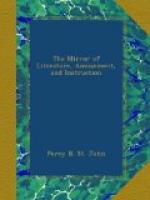* * * * *
SPIRIT OF THE PUBLIC JOURNALS.
* * * * *
THE NEW MAGAZINE.
Mr. Campbell, the Poet, has seceded from the New Monthly Magazine, and commenced a magazine of his own—The Metropolitan. Without prejudice to the first-mentioned work, he has our best wishes for his new undertaking. The New Monthly Magazine has, however, supplied the Mirror with brighter columns than any of its contemporaries, and we are mindful of the obligation, especially for that gay and lively description of writing which is really the patter of literature. It will soon be seen whether Mr. Campbell and his forces succeed. The Number before us is, for a first, excellent. The Editor’s Paper on Ancient Geography, with which it opens, is worth the price of the whole magazine: nay, it is worth more than many a modern quarto. Other papers are attractive; and there is much of the spirit of the times throughout the Number.—Poland, the Political Times, and the Lord Chancellor’s Levee—are vividly written. The last is a good specimen of the “keep moving” style of a Magazine. We intend to quote largely from the
Memoirs of the Macaw of a Lady of Quality,
BY LADY MORGAN:
I am a native of one of the most splendid regions of the earth, where nature dispenses all her bounties with a liberal hand; and where man and bird are released from half the penalties to which, in other climes, their flesh is heir. I was born in one of those superb forests of fruit and flowers so peculiar to the Brazils, which stood at no great distance from an Indian village, and was not far removed from an European settlement. This forest was impervious to human footsteps. A nation of apes occupied the interior; and the dynasty of the Psittacus Severus, or Brazilian queen macaw, inhabited the upper regions.—Several subject-states of green and yellow parrots constituted our colonial neighbours. My family held the highest rank in the privileged classes of our oligarchy; for our pride would not admit of a king, and our selfishness (so I must call it) would allow of no rights. We talked nevertheless in our legislative assemblies of our happy constitution, which by tacit agreement we understood to mean “happy for ourselves;”




